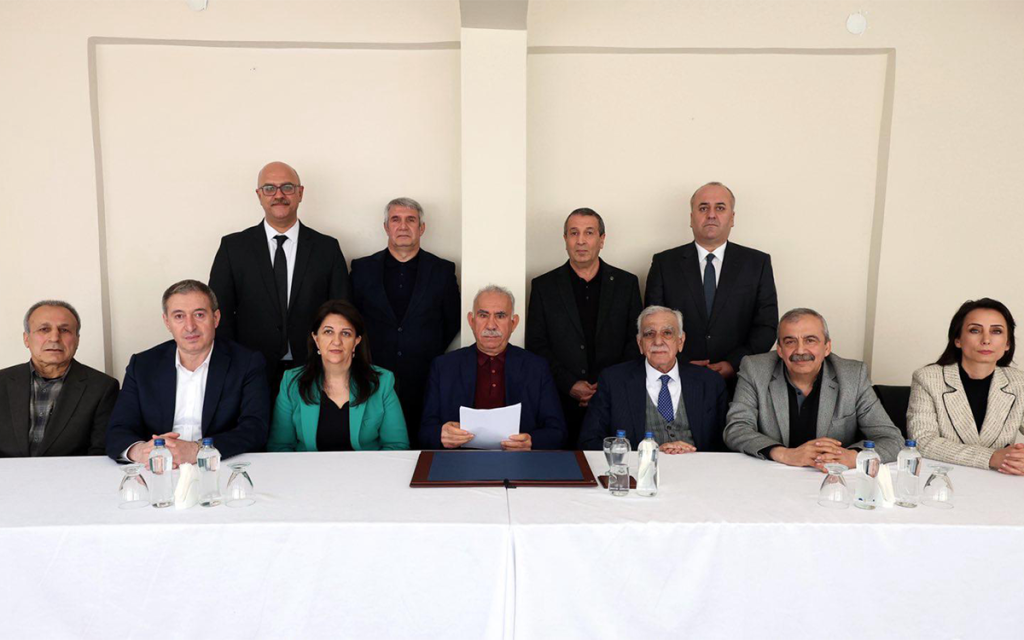Abdullah Öcalan, the imprisoned leader of the Kurdistan Workers’ Party (PKK), recently met with family members in a rare visitation allowed by Turkish authorities during the Eid al-Fitr celebrations. This visit marked the first opportunity for Öcalan to see relatives since October, when he was permitted a meeting after a lengthy period of isolation. Alongside him, three other inmates—Ömer Hayri Konar, Hamili Yıldırım, and Veysi Aktaş—also received family visits at the İmralı Island Prison, highlighting ongoing issues surrounding prisoner rights and family access. Since 2014, visits have been severely restricted for Öcalan, raising concerns among human rights advocates regarding the treatment of political prisoners in Turkey.
| Article Subheadings |
|---|
| 1) Significant Family Visit Amid Restrictions |
| 2) Historical Context of Öcalan’s Isolation |
| 3) Challenges Faced by Other Inmates |
| 4) Impact on Legal Access and Rights |
| 5) Political Implications of Recent Engagement |
Significant Family Visit Amid Restrictions
On the occasion of Eid al-Fitr, Abdullah Öcalan had the opportunity to engage with family, a rare event given the long-standing restrictions placed on his communications. The recent visit permitted by prison authorities marks a significant event, as Öcalan’s contact with the outside world has been limited severely since his imprisonment in 1999. During this visit, he met with his nephew, Ömer Öcalan, who serves as a Member of Parliament for the Peoples’ Equality and Democracy (DEM) Party. This visit is particularly meaningful in light of the decades of conflict that have embroiled the Kurdish issue in Turkey, and it has sparked discussions about the future of political engagement regarding Kurdish rights.
Historical Context of Öcalan’s Isolation
Öcalan’s isolation has been a point of contention since he was captured and incarcerated. Since 2014, he has had only seven meetings with family members, a stark contrast to the rights typically afforded to prisoners. The last visit before this recent opportunity occurred on October 23, following a 44-month period where he was held incommunicado. Such stringent limitations highlight the Turkish government’s approach towards Öcalan, often seen as a critical figure in negotiating peace due to his long-standing role in the PKK’s evolution from a militant organization to one that can advocate for political rights. The impact of such restrictions extends beyond Öcalan himself, influencing ongoing political discourse and strategies regarding Kurdish autonomy and rights.
Challenges Faced by Other Inmates
The challenges faced by other inmates at İmralı are equally concerning. Ömer Hayri Konar, Hamili Yıldırım, and Veysi Aktaş have also experienced major limitations on their familial contact. Konar and Aktaş were both transferred to İmralı in March 2015, and since then, they have had only four family visits each, including the most recent occasion. Yıldırım, on the other hand, has had just three visits. Such infrequent contact has raised alarms among human rights organizations that advocate for better treatment and transparency regarding political prisoners in Turkey.
Impact on Legal Access and Rights
Legal access for Öcalan and the other prisoners has been critically limited; records indicate that Öcalan has had only five meetings with his legal representatives over the past fourteen years. The last meeting occurred on August 7, 2019, demonstrating a troubling trend that highlights the erosion of legal rights afforded to inmates, particularly those involved in politically sensitive cases. The other inmates at İmralı have similarly endured this lack of legal access, as Konar, Yıldırım, and Aktaş have not met with their lawyers since their transfer to the facility. Such conditions have led to calls for humanitarian intervention and scrutiny from international human rights bodies.
Political Implications of Recent Engagement
The recent visit and Öcalan’s ongoing discussions with political delegations reflect a broader engagement strategy aimed at resolving longstanding issues surrounding the Kurdish cause. A delegation from the DEM Party visited İmralı three times in recent months, on December 28, January 22, and February 27, to discuss the Kurdish perspectives in Turkey’s political climate. Following the third meeting, Öcalan made a significant call for the PKK to initiate the cessation of hostilities after decades of armed conflict. His statement underscores his influence and the steps being taken towards a negotiated resolution to reduce tension and promote peace within the region.
| No. | Key Points |
|---|---|
| 1 | Öcalan’s family visit occurred during Eid al-Fitr, highlighting restricted access for political prisoners. |
| 2 | Since 2014, Öcalan has had only seven family visits, raising human rights concerns. |
| 3 | Other inmates at İmralı, such as Konar and Yıldırım, also face severe limitations on family visits. |
| 4 | Legal access for Öcalan has been nearly non-existent, with only five meetings in fourteen years. |
| 5 | There is a growing political dialogue aimed at addressing the Kurdish issue in Turkey. |
Summary
The recent family visit of Abdullah Öcalan during Eid al-Fitr underscores the ongoing debates surrounding prisoner rights and political engagement in Turkey. As restrictions continue, not only for Öcalan but also for his fellow inmates, the narrative around Kurdish rights remains complex and fraught with challenges. The political implications of Öcalan’s statements following family visits may pave the way for meaningful dialogue and efforts toward a peaceful resolution of the Kurdish issue.
Frequently Asked Questions
Question: Who is Abdullah Öcalan?
Abdullah Öcalan is the founder and leader of the Kurdistan Workers’ Party (PKK), a militant organization that has been involved in an armed struggle against the Turkish state since the 1980s.
Question: Why are family visits for Öcalan restricted?
Family visits for Öcalan are heavily restricted due to the Turkish government’s policies on political prisoners, particularly those affiliated with groups labeled as terrorist organizations.
Question: What are the current challenges faced by other inmates at İmralı Prison?
Other inmates at İmralı Prison face similar restrictions on family visits and legal access, raising concerns among human rights advocates regarding their treatment and rights within the Turkish prison system.


